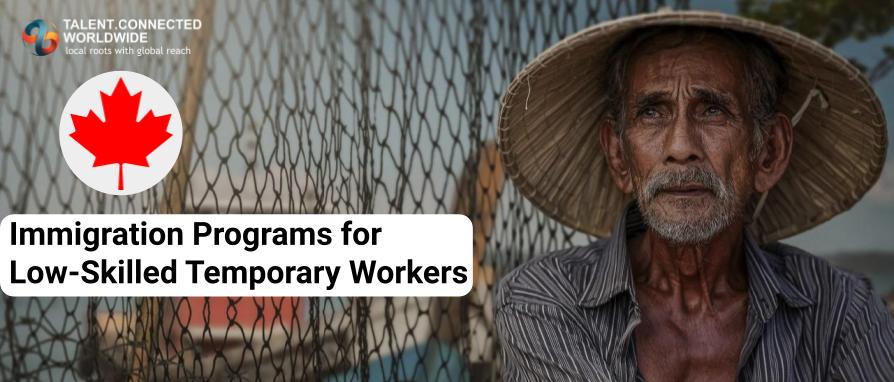
The Canadian government offers a wide range of low-skilled temporary worker programs. These programs allow foreign nationals to come to Canada as temporary residents and work for Canadian employers in various fields. Temporary visas are a good opportunity for individuals who do not have strong academic skills, and who would otherwise find it difficult to enter the country for work-related purpose.
These programs are designed to fill labor shortages in low skilled occupations immediately, and generally in sectors defined as seasonal and/or intermittent, such as agriculture.
They also provide great opportunities for individuals who wish to immigrate permanently. For settling permanently, the applicant must upgrade their work permit or change it into another one that leads them towards permanent residence.
5 Canada Immigration Programmes for Low Skilled Temporary Workers
Canada Immigration Programmes for Low Skilled Temporary Workers are a one-way temporary entry programs that allow foreign workers to temporarily enter Canada’s economy to meet specific labor shortages. These programs allow employers to hire foreign workers when they cannot find Canadians or permanent residents to fill the job openings.
1. Agri-food Immigration Pilot
The Agri-food Immigration Pilot program was created to address labor shortages in Canada’s agri-food sector.
The following eligibility criteria must be met.
- He/she must have work experience that qualifies him/her for the position.
- The applicant must be able to show that he or she has a valid offer of employment.
- He/she must meet the language requirements or risk being denied a visa.
- Applicants must meet the educational qualifications.
- Proof of sufficient funds.
- Lastly, you have maintained your status as a temporary resident if he/she already lives in Canada.
The Agri-food Immigration Pilot has a quota for the number of applications it processes each year. The program starts on January 1 every year and is filled by those who apply first. However, this specific pilot will end in 2023 once its quota is reached—whether or not all applications have been processed within the allotted time period
2. Atlantic Immigration Pilot Program
The Atlantic Immigration Pilot helps Canadian employers find foreign workers for open positions.
If you are accepted and meet the requirements for immigration, you can move to one of Canada’s Atlantic provinces which are:
- Newfoundland and Labrador
- Prince Edward Island
- New Brunswick
- Nova Scotia.
Out of 3 programs under Atlantic Immigration Pilot Program(AIPP), one part of a new Canadian immigration pilot program is the Atlantic Intermediate-Skilled Program, which is intended to address shortages in low-skilled jobs.
Eligibility for immigration to Canada under the Atlantic Intermediate-Skilled Program is given below:
Work Experience
- You must have worked 30 hours per week for a continuous 12-month period, excluding any self-employment.
- Work experience must be in occupations that require NOC skill level C, such as industrial butchers, long-haul truck drivers and hospitality staff, etc.
Education
- You must have a Canadian secondary or post-secondary certificate, diploma or degree from an institution that is listed in the official government list of institutions
OR
- A foreign degree, diploma, or certificate equivalent to the credential you are applying for and an Educational Credential Assessment (ECA) report.
In addition to the above requirements, you will also need to take an approved language test and show that you have enough money to support yourself and any family coming with you.
The AIPP closed on December 31, 2021, and IRCC stopped accepting Pilot applications on March 5, 2022.
On January 1, 2022 IRCC officially made the Atlantic Immigration Program (AIP) a permanent fixture.
For more information on updates refer to this link
3. The Rural and Northern Immigration Pilot
The Rural and Northern Immigration Pilot (RNIP) is a program that uses the community as its foundation. The program distributes benefits of economic immigration—such as a permanent residence for skilled foreign workers who wish to live in Canada—to smaller communities by creating pathways for them within larger cities.
The four stages of the RNIP application process are as follows:
1) To be eligible for a Canadian immigration program and have your application accepted, you must meet both IRCC’s general requirements (such as being of good health) and the specific ones set by that community.
2) Search for a job with an employer who is a member of one of the participating communities.
3) When you have a job offer, ask the community for a recommendation.
4) The procedures used by each community will vary, as mentioned before. The documents needed to apply for a recommendation can be found on the government-approved websites.
4. Temporary Foreign Worker Program
Employers who want to hire foreign workers are required by law to obtain a Labour Market Impact Assessment (LMIA) before hiring them. Assessment documents will prove that no Canadian citizens or immigrants with work permits are available and qualified to fill the position.
The Low Wage Worker Stream is one of the TFWP’s many streams. It offers a way for low-skilled temporary workers to immigrate to Canada.
5. Provincial Nominee Program(PNP)
The Provincial Nominee Program (PNP) matches foreign skilled workers with provinces and territories interested in inviting them, thereby allowing the immigrants to settle in a specific province of Canada.
Skilled workers are nominated by each province, based on their labor market needs. Nominee applicants can achieve far greater success by applying for positions in provinces where their skills are needed.
Demand for Low Skilled Workers in Canada
The supply of low-skilled workers in Canada is expected to remain relatively stable over the next five years. However, the demand for their labor is projected to rise due to labor shortages and increased productivity.
Low-skilled workers are eligible for a number of visas, making Canada an appealing destination for immigrants.
A healthy economy depends not only on large businesses, but also small enterprises and the unskilled workers who are crucial to their success.
As Canada strives to welcome more than 1.23 million immigrants as permanent residents by 2023, now is a great time for foreign nationals to start their journey there.
There are many visa and immigration programs available, so immigrants have plenty of options.
Low-skill jobs often involve manual labor, factory assembly or sales positions.
The following National Occupational Classification (NOC) categories are used to describe low-skill occupations:
- NOC Skill Type C, which consists of jobs that usually require some college courses and/or industry-specific training.
- NOC Skill Type D, which includes occupations in which workers learn to perform their job through on-the-job training. No prior training is needed.
Eligibility for Work Permit for Canada Low Skilled Immigration
To qualify for a Work Permit for Canada Low Skilled Immigration, you have to fulfill the following criteria:
- Before Canadian employers can hire foreign workers for jobs at the low-skilled level, they must apply to and receive approval from Human Resources and Skills Development Canada (HRSDC) and get a positive labor market opinion.
- If the employer can demonstrate that no Canadian citizen or permanent resident is available for the job, HRSDC will issue a positive Labor Market Opinion.
- You should apply immediately after you receive written confirmation of your job offer or contract, along with a letter from the relevant government department approving your work permit application.
- You must convince the Immigration department’s officer that you meet all requirements for a temporary stay in Canada.
- Explain to an officer that you will leave Canada at the end of your employment, and give reasons why.
- You can demonstrate that you satisfy the hiring manager’s needs by providing evidence of your qualifications, such as degrees or work experience.
- Show that you have enough money to support yourself during your stay in Canada and pay for a return trip home.
- You should have no criminal record.
- You should be healthy and emotionally balanced.
- You should NOT pose a threat to Canadian security.
- If you are submitting documents that contain information in a language other than English or French, they must be translated into English by an approved translator.
- You should provide any documents requested by the officer to prove your eligibility.
Conclusion
Canada is an amazing place to live. It has its own unique culture, country, and people. It offers many opportunities for all kinds of people from different backgrounds, education levels, and skillsets. The Canadian low-skilled worker program is a great way to immigrate to Canada because it allows people with a low level of education to get working in Canada. I strongly recommend anyone who is interested in immigrating to Canada as a temporary worker or permanent resident should apply without delay as it will lead you on a path that can change your life forever.






